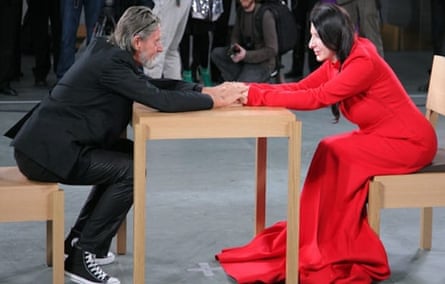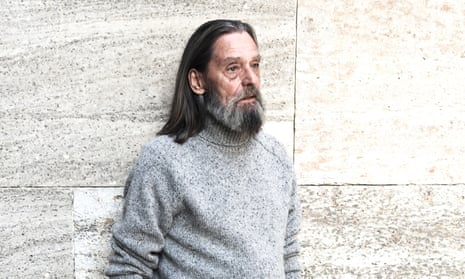The former romantic partner of Marina Abramović, the world’s best-known performance artist, has claimed victory in a legal battle sparked after he said that she was in violation of a contract over their joint works.
Abramović and Ulay, born Frank Uwe Laysiepen, had been lovers and co-creators for more than a decade before their separation in 1988, during which time they devised a series of works exploring their partnership.
Nearly a year on from the launch of Ulay’s lawsuit against Abramović however, a Dutch court on Wednesday ordered her to pay him more than €250,000 arising from the sales of joint works and a commercial re-enactment for Adidas of a joint piece.
The couple’s relationship came to prominence in 2010, during an installation at the Museum of Modern Art in New York in which Abramović sat in a chair in a gallery for eight hours a day and invited strangers to sit opposite her and look into her eyes.
When he unexpectedly took a seat, she began to cry and reached across to hold his hands; the video of the encounter has been viewed by millions on YouTube.
Ulay launched a lawsuit last year in which he claimed that Abramović has violated a contract they signed in 1999 covering works they had created together. He claimed that Abramović failed to provide him with accurate statements of sales, and had paid him only four times in the course of 16 years.
In its ruling, the court in Amsterdam found that Ulay was entitled to royalties of 20% net on the sales of their works, as specified in the original 1999 contract, and ordered Abramović to back date royalties of more than €250,000 (£215,000) as well as more than €23,000 in legal costs
Additionally, she was ordered to provide full accreditation to joint works listed as by “Ulay/Abramović” covering the period from 1976 to 1980 and “Abramović/Ulay” for those from 1981 to 1988.

Abramović was also given two weeks to provide a complete written record relating to all reproductions, copies made of work from 2007 to the present, and sales.
On Wednesday, Ulay described the protracted legal dispute as “unpleasant and distressful” and likened the battle to his own successful victory over cancer.
“I won the case on the most crucial points,” he said. “The relief was like shedding my skin, physical and mental.
“My cancer ordeal was aggressively threatening my life and the massive legal battle with Abramović was threatening my existence. To my opinion, the court verdict was fair and just to the truth.”
In an interview with the Guardian last year, he said: “She is not just a former business partner. The whole oeuvre has made history. It’s now in school books. But she has deliberately misinterpreted things, or left my name out.”
Dutch art lawyer Edgar Tijhuis said of the verdict: “This is a clear victory for Ulay, by any standards.”
There was no immediate public comment on Wednesday from Belgrade-born Abramović, who is based in New York. Famous for her more than 40 years of performance art, one of her earliest works in 1974 invited the audience to use an assortment of objects on her, from a feather boa to flowers to a loaded pistol. She told the Guardian that she was “ready to die” during the performance.
